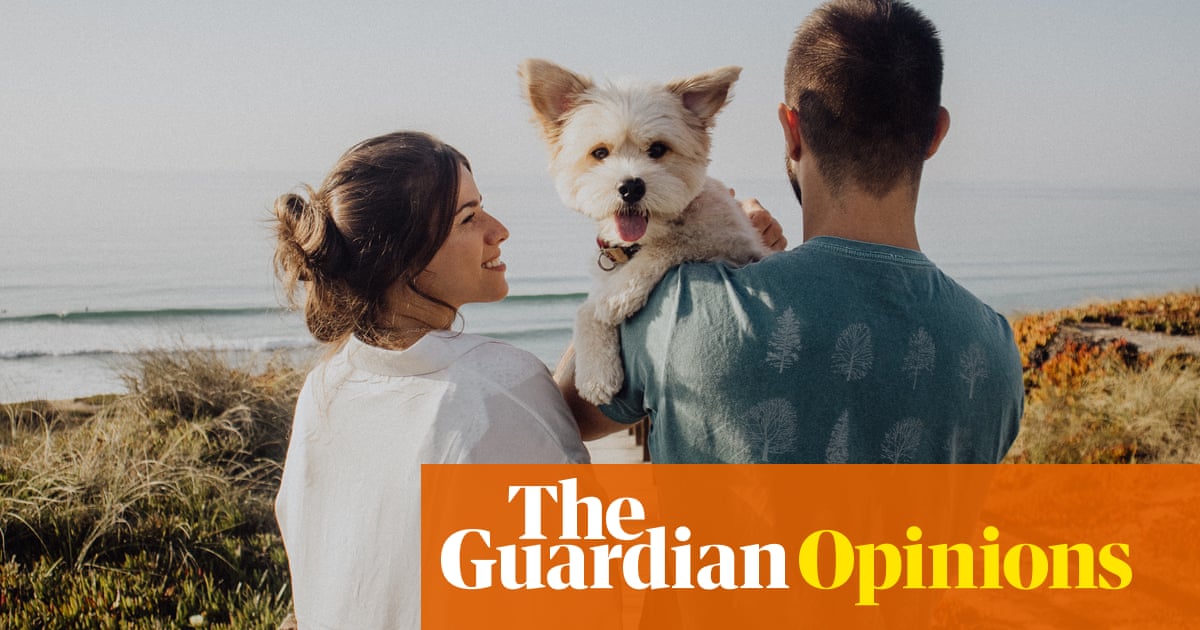Iam starting to think the international research community might be in the pay of pets. It’s not an allegation I make lightly, but have you been following companion animal news recently? First,research from the University of Kentconcluded pets were equivalent to £70,000-worth of life satisfaction and wellbeing,roughly equivalent to the psychological benefitsof being married. Then,in a Hungarian study, dog owners reported “greater satisfaction with their dogs than with any human partner except their child”. And nowa survey of 31,299 pet ownersreveals 58% of people find cats and dogs more comforting than people at stressful times, outranking spouses, friends and kids. It all feels a bit OTT; a bit, “Did a dog write this?”
Someone needs to fight back for human relationships, and it falls to me. This is not a position in which I ever expected to find myself. British women of my vintage tend to model ourselves on the late Queen, wearily tolerating humans but joyfully enthused by corgis andcows. In girlhood we fixated on guinea pigs or ponies (shades of Penelope Chetwode, who on becoming pregnant, said: “I wish it could be a little horse”); now we manage our menopause symptoms by acquiring and then lavishing love on rescue donkeys, a flock of homicidal geese or a goldendoodle with psychological problems.
It’s pretty much a given that we prefer pets to partners. I’m certainly more physically and verbally affectionate with my favourite hen than with my spouse: “I adore you,” I whisper fervently, cradling her in my arms and kissing her tiny, empty head. When my husband puts his arm round me, I tell him he’s hurting my dodgy hip and wriggle free to complain about the recycling.
But at the risk of alienating my community, I do like him much better than any pet. Because there are things partners can offer that pets absolutely cannot – and I don’t mean sex (though, yes, that too).
Opposable thumbsHuman thumbs are great: no hen has never made me a sandwich (or, indeed, chauffuered me on a four-hour trip to Preston to collect more hens).
Moral supportWhen I was made redundant, my dog sat on my knee for five minutes, tops. In a crisis, my husband can be counted on to conjure 14 schemes of escalating insanity to resolve it while mixing me near-fatally strong drinks and inventing disgusting insults for my adversaries. A comforting physical presence is good, but jokes and dry martinis are better.
Sharing the burdenYour dog, cat or horse doesn’t care about persistent black mould, unauthorised overdraft fees or why the boiler is making that ominous noise. It’s understandable – but it’s also sort of rude. You live here too, mate, and much of the overdraft is attributable to: your Dreamies habit; stealing and eating an entire fruitcake; trying to die from a tummy ache (a horse thing, apparently); and so on.
LifespanUnless you have a tortoise, one the greatest tragedies of companion animals is our incompatible lifespans. If your pet is a tortoise, it’s worse: you’ll need to consider succession planning (our sons are bafflingly unthrilled by their future reptilian responsibilities).
A sense of occasionHumans generally know when a fuss needs to be made.Petshave no sense of occasion, except in the sense that your birthday/wedding/Beyoncé gig is precisely the time they will eat an entire fruitcake or be struck by life-threatening tummy ache.
MannersI don’t exactly have dowager countess etiquette standards, but I do have limits, and jumping on to my plate to steal my lunch, as my hens do, crosses a red line. My husband would never do this; nor would he dream of waking me at 4.45am to demand breakfast, like my best friend’s cat does most mornings.
GossipThis is the clincher. Yes, a companion who can speak is a mixed blessing but consider this: pets never want to share an exciting neighbourhood scandal they’ve discovered, chew over family drama or engage in scurrilous speculation about acquaintances. You will never catch your pet’s eye in public and know how much fun you’ll have later rehashing what just went down. And that, for me, is the pinnacle of relationship satisfaction, whatever Big Pet tries to tell us.
Emma Beddington is a Guardian columnist
